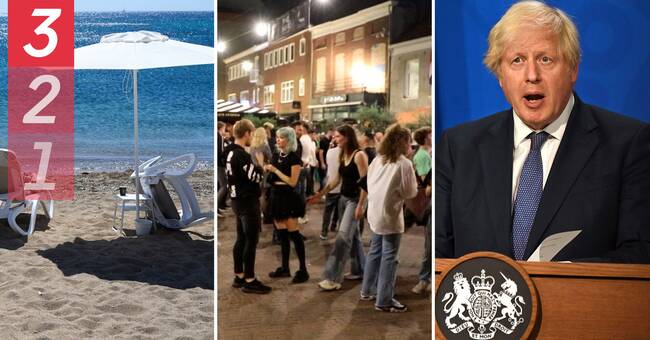Iceland
All domestic coronary restrictions were lifted at the end of June.
However, some restrictions on entry into the country remain.
Iceland has had 9.34 new cases per 100,000 inhabitants during weeks 25 and 26, according to ECDC.
Spain
In Spain, the different regions control which restrictions apply.
In several places, the local government has introduced nocturnal curfews and restrictions on the opening hours of restaurants.
Spain has had 215 new cases per 100,000 inhabitants in the last two-week period.
England
The British government has postponed the lifting of a number of restrictions, but now the big reopening looks set to end on 19 July.
Among other things, the use of mouth guards is voluntary and nightclubs are allowed to open.
The infection has increased during the spring and summer, but the number of deaths has been few compared with before.
Other parts of the UK make their own decisions about which restrictions should apply.
England has had 318 new cases per 100,000 inhabitants in the past week, according to authorities.
Italy
Most of the restrictions have been lifted, and at the end of June the requirement to wear mouth guards outdoors was abolished.
The requirement to wear it in public indoor environments still remains.
Italy has had 17 new cases per 100,000 inhabitants in the last two-week period.
Netherlands
An increase in the number of new cases has led the Netherlands to reintroduce a number of restrictions.
The country's nightclubs have closed, restaurants have had limited opening hours and major events have been stopped.
The country's Prime Minister Mark Rutte has apologized for lifting the restrictions.
The Netherlands has had 63 new cases per 100,000 inhabitants in the last two-week period.
France
Many of the restrictions have been lifted, such as curfews.
Nightclubs have opened - but only for those who can present a negative test result or vaccination certificate.
Such a "health pass" will also be required to visit, for example, restaurants and malls.
In addition, vaccination requirements are introduced for healthcare professionals.
France has had 43 new cases per 100,000 inhabitants in the last two-week period.
Sweden
Sweden has developed a plan for reopening that has so far not backed down.
Step three of the plan will be implemented from 15 July.
Sweden has had 38 new cases per 100,000 inhabitants in the last two-week period.
Norway
Norway has gradually opened up society in a four-step plan.
Step three was carried out at the end of June, but the government has made an adjustment of step four because it wants to wait for the effects of the delta variant.
Rules that still apply are, for example, table service at bars and restaurants.
Several restrictions on entry to Norway still apply, the situation will be re-evaluated in a few weeks, according to Prime Minister Erna Solberg.
Norway has had 48 new cases per 100,000 inhabitants in the last two-week period.
Denmark
Several entry rules still apply to those who are not Danish citizens, resident in Denmark, or living in a border region.
A vaccine certificate is required for several cultural and sports activities.
Oral protection requirements in public transport only apply when you need to get up.
Denmark has had 68 new cases per 100,000 inhabitants in the last two-week period.
Finland
Entry requires a negative test result or vaccination certificate.
Finland has a plan for the lifting of restrictions that is adapted to the current infection situation.
In June, the recommendation to wear a mouth guard and to work remotely was extended.
The rules for outdoor gatherings have been eased, for indoor gatherings restrictions still apply.
Finland has had 38 new cases per 100,000 inhabitants in the last two-week period.

